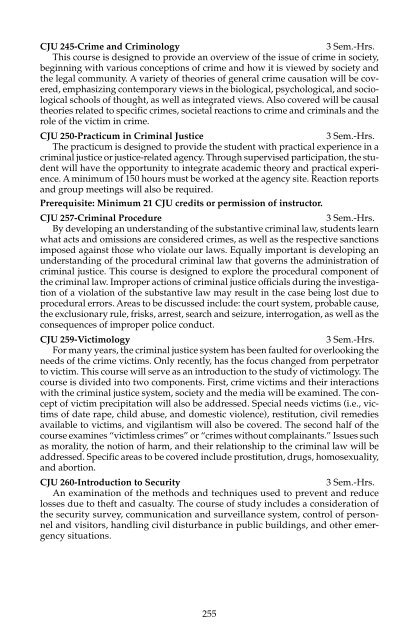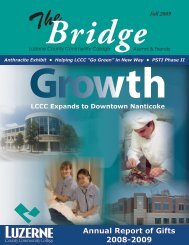2004-2005 COLLEGE CATALOG - Luzerne County Community ...
2004-2005 COLLEGE CATALOG - Luzerne County Community ...
2004-2005 COLLEGE CATALOG - Luzerne County Community ...
Create successful ePaper yourself
Turn your PDF publications into a flip-book with our unique Google optimized e-Paper software.
CJU 245-Crime and Criminology 3 Sem.-Hrs.<br />
This course is designed to provide an overview of the issue of crime in society,<br />
beginning with various conceptions of crime and how it is viewed by society and<br />
the legal community. A variety of theories of general crime causation will be covered,<br />
emphasizing contemporary views in the biological, psychological, and sociological<br />
schools of thought, as well as integrated views. Also covered will be causal<br />
theories related to specific crimes, societal reactions to crime and criminals and the<br />
role of the victim in crime.<br />
CJU 250-Practicum in Criminal Justice 3 Sem.-Hrs.<br />
The practicum is designed to provide the student with practical experience in a<br />
criminal justice or justice-related agency. Through supervised participation, the student<br />
will have the opportunity to integrate academic theory and practical experience.<br />
A minimum of 150 hours must be worked at the agency site. Reaction reports<br />
and group meetings will also be required.<br />
Prerequisite: Minimum 21 CJU credits or permission of instructor.<br />
CJU 257-Criminal Procedure 3 Sem.-Hrs.<br />
By developing an understanding of the substantive criminal law, students learn<br />
what acts and omissions are considered crimes, as well as the respective sanctions<br />
imposed against those who violate our laws. Equally important is developing an<br />
understanding of the procedural criminal law that governs the administration of<br />
criminal justice. This course is designed to explore the procedural component of<br />
the criminal law. Improper actions of criminal justice officials during the investigation<br />
of a violation of the substantive law may result in the case being lost due to<br />
procedural errors. Areas to be discussed include: the court system, probable cause,<br />
the exclusionary rule, frisks, arrest, search and seizure, interrogation, as well as the<br />
consequences of improper police conduct.<br />
CJU 259-Victimology 3 Sem.-Hrs.<br />
For many years, the criminal justice system has been faulted for overlooking the<br />
needs of the crime victims. Only recently, has the focus changed from perpetrator<br />
to victim. This course will serve as an introduction to the study of victimology. The<br />
course is divided into two components. First, crime victims and their interactions<br />
with the criminal justice system, society and the media will be examined. The concept<br />
of victim precipitation will also be addressed. Special needs victims (i.e., victims<br />
of date rape, child abuse, and domestic violence), restitution, civil remedies<br />
available to victims, and vigilantism will also be covered. The second half of the<br />
course examines “victimless crimes” or “crimes without complainants.” Issues such<br />
as morality, the notion of harm, and their relationship to the criminal law will be<br />
addressed. Specific areas to be covered include prostitution, drugs, homosexuality,<br />
and abortion.<br />
CJU 260-Introduction to Security 3 Sem.-Hrs.<br />
An examination of the methods and techniques used to prevent and reduce<br />
losses due to theft and casualty. The course of study includes a consideration of<br />
the security survey, communication and surveillance system, control of personnel<br />
and visitors, handling civil disturbance in public buildings, and other emergency<br />
situations.<br />
255



